|
Printables |
PowerPoints |
Online exercises |
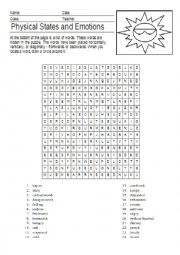
|
Physical States and Emotions Part 4 of 4
24 adjective word search related to Physical States and Emotions part 1 and 2. Answer key included.
Level: elementary
Age: 8-100
Type: worksheet
Downloads: 182
|
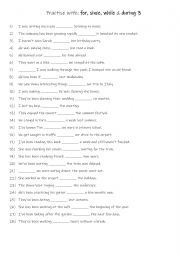
|
A2+-B1 Practise with for, since, while & during (3)
Learning to use for, since, during, and while is important because these words help student�s express time accurately in English, especially when talking about the duration and timing of events. For indicates the length of time an action takes place, while since pinpoints when an action started and continues until now, helping to show continuity. D...
Level: intermediate
Age: 9-100
Type:
Downloads: 100
|
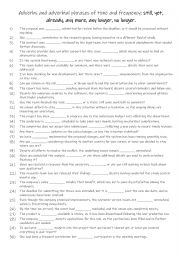
|
B1+-B2 Adverbs and adverbial phrases of time and frequency still, yet, already, any more, any longer, no longer.
These adverbs and phrases help students describe actions, events, and situations with greater detail, making their language more engaging and nuanced. Language proficiency tests often include questions that require understanding and using these adverbs correctly, so practicing them can improve exam performance. Understanding and using these adverbs...
Level: intermediate
Age: 12-100
Type:
Downloads: 132
|
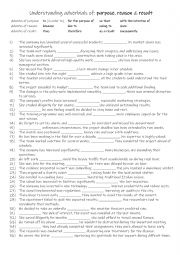
|
B1+ -C1 Understanding 12 adverbials of purpose, reason & result 1
Learning to use adverbials of purpose, reason, and result enhances clarity and coherence in communication. These adverbials allow students to express intentions, causes, and outcomes clearly, making their speech and writing more logical and well-structured. Mastering these adverbials also helps them link ideas smoothly, providing a stronger flow i...
Level: intermediate
Age: 9-100
Type:
Downloads: 105
|
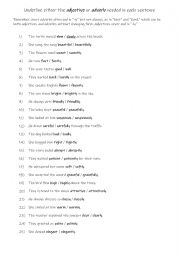
|
Adjective or adverb practise
Students read each sentence to see and work out if a noun or verb needs to be modified. They can either underline the correct answer or delete the wrong one.
Remember, most adverbs often end in -ly but not always, as in fast and hard, which can be both adjectives and adverbs without changing form. Adjectives never end in -ly.
Answers on page 2
Level: elementary
Age: 10-100
Type: worksheet
Downloads: 110
|
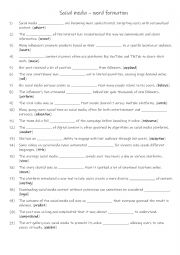
|
B1 Social media word formation
Understanding word formation allows students to expand their vocabulary, enabling them to express themselves more precisely and creatively. Knowing how to manipulate words helps them create varied sentence structures, making their writing more engaging and dynamic. Mastering word formation is key to achieving higher levels of language proficiency, ...
Level: intermediate
Age: 8-100
Type: worksheet
Downloads: 115
|
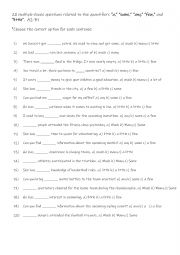
|
Quantifiers practise using a, some, any, few, and little.
20 multiple-choice questions related to the quantifiers a,some,any, few,and little. A2-B1.Answers on page 2
Level: elementary
Age: 10-100
Type: worksheet
Downloads: 106
|
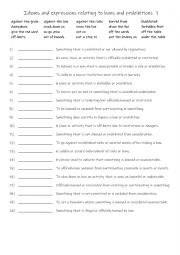
|
B1+-C1 Idioms and expressions relating to bans and prohibitions 1
First, students need to familiarise themselves with the 20 idioms and expressions and their meanings. Then they read the definitions to see which one is being described and write that word in the space provided Answers on page 2.
Level: intermediate
Age: 12-100
Type:
Downloads: 112
|
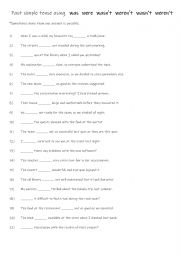
|
A1 Past simple tense using: was, were, was not & were not
Students read the sentences and complete them with the correct form of verb to be. Answers on page 2.
Level: elementary
Age: 8-100
Type: worksheet
Downloads: 121
|
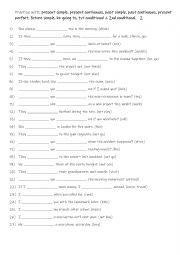
|
A2+-B1 Practise with present simple, present continuous, past simple, past continuous, present perfect, future simple, be going to, 1st conditional & 2nd conditional. 2
Practising these tenses allows students to speak confidently about everyday situations, past events, future plans, and hypothetical scenarios. It improves their ability to communicate with precision, enhances fluency, and prepares them for more advanced grammar. Mastery of these structures supports clearer expression of ideas and better understandi...
Level: intermediate
Age: 10-100
Type:
Downloads: 111
|
|
|
|
|












